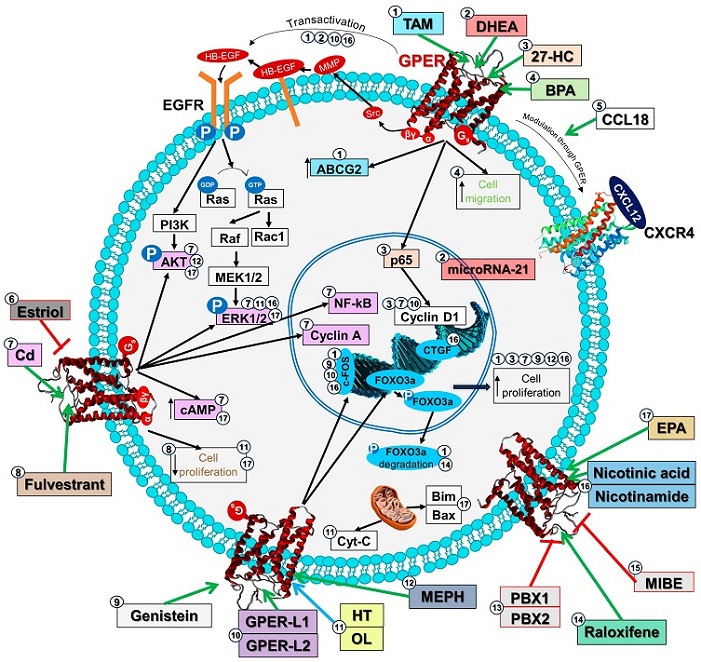Nikhil Prasad Fact checked by:Thailand Medical News Team Jun 10, 2024 1 year, 8 months, 1 week, 5 days, 18 hours, 28 minutes ago
Cancer News: Understanding Cancer's Stealthy Mechanisms
Cancer remains a global challenge, claiming millions of lives annually. A significant part of this struggle is the battle against chemoresistance, where cancer cells adapt to survive chemotherapy. Recently, scientists have turned their attention to a relatively obscure player in this battle: the G protein-coupled estrogen receptor (GPER). This receptor, found in various cells, could hold the key to new cancer treatments. This
Cancer News report covers a study review that unveils the role of GPER in cancer progression.
 The GPER Receptor Role In Cancer Progression Pathways.
Biological effects and activation pathways of non-canonical GPER ligands. Agonists are connected to GPER by a green arrow, while antagonists’ inhibition are indicated by a red. Each ligand is assigned a number that appears in the corresponding signaling pathway activated by that ligand, as well as in the box with the biological effect into which those pathways are translated
What is GPER?
The GPER Receptor Role In Cancer Progression Pathways.
Biological effects and activation pathways of non-canonical GPER ligands. Agonists are connected to GPER by a green arrow, while antagonists’ inhibition are indicated by a red. Each ligand is assigned a number that appears in the corresponding signaling pathway activated by that ligand, as well as in the box with the biological effect into which those pathways are translated
What is GPER?
GPER is a type of protein that interacts with estrogen, a hormone crucial for many bodily functions. Unlike the well-known estrogen receptors found in cell nuclei, GPER is located on cell surfaces and can trigger rapid cellular responses. Discovered in the 1990s, GPER's role in health and disease is only now coming into focus.
GPER's Structure and Function
GPER belongs to a family of receptors known for their seven transmembrane domains, meaning they span the cell membrane seven times. This structure allows GPER to interact with various molecules, including natural hormones like estrogen and synthetic drugs. GPER's ability to change shape enables it to bind different molecules, making it a versatile player in cellular signaling.
GPER and Cancer Progression
Research has shown that GPER plays a significant role in the progression of several cancer types, including breast, ovarian, lung, thyroid, and endometrial cancers. In these cancers, GPER is often overexpressed, meaning it is found in higher levels compared to normal tissue. This overexpression can lead to increased cancer cell growth and survival, contributing to the spread and resilience of tumors.
Chemoresistance and GPER
One of the most challenging aspects of cancer treatment is chemoresistance, where cancer cells become resistant to chemotherapy drugs. GPER appears to be involved in several mechanisms that contribute to this resistance:
-Epithelial-Mesenchymal Transition (EMT): This process allows cancer cells to become more mobile and invasive. GPER can promote EMT, making it easier for cancer to spread.
-Multidrug Resistance Pumps: These pumps expel chemotherapy drugs from c
ancer cells, reducing their effectiveness. GPER can increase the activity of these pumps, helping cancer cells survive treatment.
-Autophagy Regulation: Autophagy is a process where cells break down and recycle their components. GPER can influence autophagy, allowing cancer cells to survive in harsh conditions, including during chemotherapy.
Potential Therapeutic Target
Given its role in cancer progression and chemoresistance, GPER is an attractive target for new cancer therapies. Researchers are exploring drugs that can block or modulate GPER activity. By inhibiting GPER, it may be possible to make cancer cells more vulnerable to chemotherapy and prevent them from spreading.
GPER's Diverse Ligands
GPER interacts with a wide range of molecules, including:
-Natural Hormones: Estrogen and its derivatives can bind to GPER and trigger cellular responses.
-Synthetic Compounds: Drugs like tamoxifen, used in breast cancer treatment, can also interact with GPER.
-Environmental Compounds: Substances like bisphenol A (BPA), found in plastics, can activate GPER and potentially contribute to cancer progression.
Research Insights and Future Directions
Studies have shown varying levels of GPER expression in different cancers. For instance, in breast cancer, GPER expression is associated with both positive and negative outcomes depending on its location within the cell and the type of breast cancer. In some cancers, high GPER expression correlates with poor prognosis, while in others, it may indicate better survival rates.
In Silico Studies
In silico (computer-based) studies have provided insights into GPER's role across different cancers. These studies analyze large datasets to correlate GPER expression with cancer outcomes. For example, high GPER expression in glioblastoma (a type of brain cancer) is linked to better prognosis in women, whereas in colorectal cancer, it is associated with poorer outcomes.
Conclusion
GPER represents a promising target for cancer treatment due to its involvement in cancer progression and chemoresistance. Understanding how GPER works and developing drugs to inhibit its activity could revolutionize cancer therapy, making treatments more effective and reducing the likelihood of cancer recurrence. As research continues, GPER may emerge as a crucial player in the fight against cancer, offering hope for more effective treatments and better patient outcomes.
The study review by researchers from the University of Colima-Mexico was published in the peer reviewed journal: Receptors.
https://www.mdpi.com/2813-2564/3/2/12
For the latest
Cancer News, keep on logging to Thailand Medical News.
Read Also:
https://www.thailandmedical.news/news/new-insights-into-cancer-the-role-of-epigenetic-changes
https://www.thailandmedical.news/news/breakthrough-in-cancer-diagnostics-blood-proteins-signal-cancer-risk-years-in-advance
